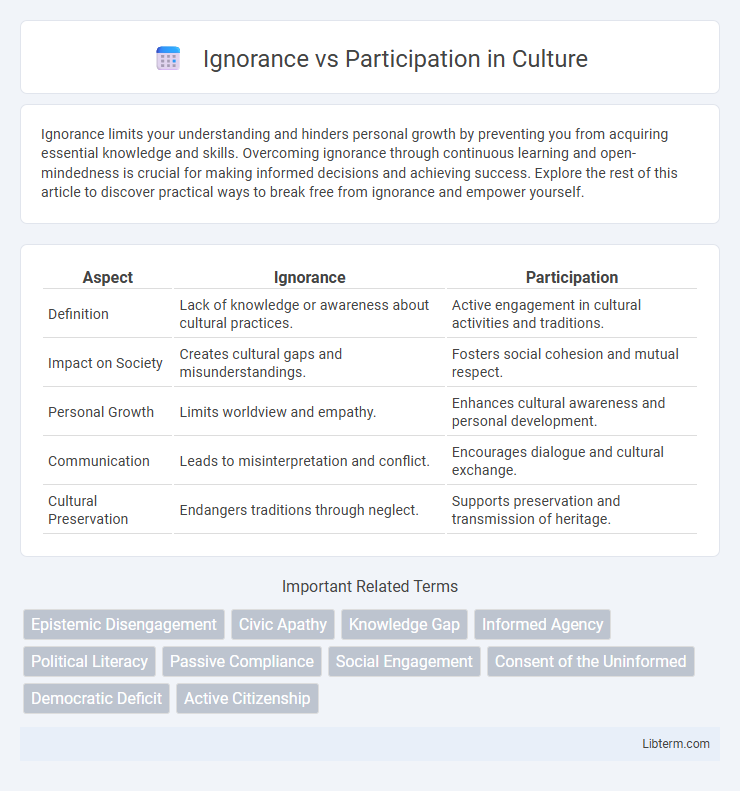Ignorance limits your understanding and hinders personal growth by preventing you from acquiring essential knowledge and skills. Overcoming ignorance through continuous learning and open-mindedness is crucial for making informed decisions and achieving success. Explore the rest of this article to discover practical ways to break free from ignorance and empower yourself.
Table of Comparison
| Aspect | Ignorance | Participation |
|---|---|---|
| Definition | Lack of knowledge or awareness about cultural practices. | Active engagement in cultural activities and traditions. |
| Impact on Society | Creates cultural gaps and misunderstandings. | Fosters social cohesion and mutual respect. |
| Personal Growth | Limits worldview and empathy. | Enhances cultural awareness and personal development. |
| Communication | Leads to misinterpretation and conflict. | Encourages dialogue and cultural exchange. |
| Cultural Preservation | Endangers traditions through neglect. | Supports preservation and transmission of heritage. |
Understanding Ignorance: Definitions and Dimensions
Ignorance encompasses not only a lack of knowledge but also deliberate disregard and unawareness in various contexts, making it multifaceted and complex. It includes factual ignorance, where information is missing, and willful ignorance, characterized by avoidance or rejection of evidence-based understanding. Recognizing these dimensions is crucial to fostering meaningful participation and informed decision-making in social, political, and educational domains.
The Power of Participation: What It Truly Means
The power of participation lies in its ability to transform passive observers into active contributors, fostering a sense of ownership and empowerment that ignorance cannot achieve. Engaging in decision-making processes enhances knowledge, promotes accountability, and drives collective progress by incorporating diverse perspectives. This active involvement breaks down barriers of misinformation and apathy, creating a more informed and dynamic society.
Causes of Ignorance in Modern Society
In modern society, causes of ignorance stem primarily from information overload, leading to selective exposure and cognitive fatigue that deter critical engagement with diverse viewpoints. The proliferation of misinformation through unregulated digital platforms exacerbates knowledge gaps by promoting echo chambers and confirmation bias. Furthermore, educational disparities and socio-economic inequalities restrict access to quality information, perpetuating cycles of ill-informed decision-making and social disengagement.
Barriers to Active Participation
Barriers to active participation often stem from lack of awareness and insufficient access to information, which reinforces ignorance and limits engagement. Socioeconomic factors, such as time constraints, financial limitations, and educational gaps, further exacerbate exclusion from community or civic activities. Overcoming these obstacles requires targeted outreach, inclusive communication strategies, and resource allocation to empower diverse populations in meaningful participation.
The Social Impact of Staying Ignorant
Staying ignorant about social issues significantly hinders community development and fosters systemic inequalities by perpetuating misinformation and apathy. Lack of awareness reduces civic engagement, weakening democratic processes and limiting collective efforts to address pressing challenges such as poverty, discrimination, and environmental degradation. Ignorance diminishes social cohesion and stifles progress, making active participation essential for informed decision-making and social transformation.
Benefits of Informed Participation
Informed participation enhances decision-making quality by incorporating diverse perspectives and accurate information, leading to more effective and equitable outcomes. It fosters transparency and accountability, empowering individuals to influence policies and community initiatives meaningfully. Engaged citizens equipped with knowledge drive social progress and strengthen democratic institutions.
Ignorance and Participation in Decision-Making
Ignorance in decision-making limits access to crucial information, leading to suboptimal outcomes and increased risks due to uninformed choices. Active participation ensures diverse perspectives, enhances transparency, and fosters more robust, inclusive decisions that reflect the collective interests. Decision-making processes benefit significantly from stakeholder engagement, reducing errors caused by knowledge gaps and promoting accountability.
Overcoming Ignorance: Strategies for Engagement
Overcoming ignorance requires intentional strategies that foster active participation through education, open dialogue, and exposure to diverse perspectives. Engaging in community initiatives and leveraging digital platforms enhance awareness and critical thinking, reducing misinformation. Consistent participation empowers individuals to make informed decisions, bridging gaps between knowledge and action.
The Role of Education in Bridging the Gap
Education plays a crucial role in bridging the gap between ignorance and participation by equipping individuals with critical thinking skills and knowledge necessary for informed decision-making. Comprehensive educational programs foster civic engagement, encourage awareness of societal issues, and promote active involvement in community and political processes. Enhancing accessibility to quality education reduces disparities and empowers marginalized groups to participate effectively in democratic systems.
Building a Culture of Participation Over Ignorance
Fostering a culture of participation empowers individuals to actively engage in decision-making processes, enhancing transparency and collective accountability. Overcoming ignorance requires accessible education and inclusive platforms that encourage diverse voices and continuous learning. Emphasizing collaboration and informed dialogue strengthens community ties and drives sustainable progress.
Ignorance Infographic

 libterm.com
libterm.com